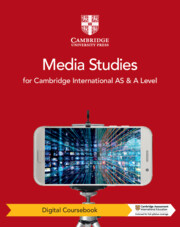Cambridge International AS & A Level Media Studies Digital Coursebook (2 Years)
Overview
Media shapes our understanding of the world. Enable your learners to develop a critical understanding of international media as they explore this vast and varied field, from production processes and technologies to media power and regulation. With a skills-based approach, the coursebook with digital access guides learners through activities of progressive complexity as they develop essential critical and analytical skills. Suitable for the Cambridge International AS & A Level Media Studies syllabus (9607), for examination from 2024. Written by expert authors and practising teachers, the coursebook provides full syllabus coverage so you can teach with confidence.
Features
- Varied activities, from analysing camera movements to understanding music consumption over time, develop students’ analytical skills
- Group discussion and project work on key topics enable students to develop collaborative and critical thinking skills
- ‘Think like a…’ feature brings the learning into a real-life context, encouraging students to imagine scenarios in real industry roles – from market research to electrical design
- ‘Take it Further’ feature expands the learning beyond the classroom, providing ideas for independent learning and research activities that deepen understanding
- ‘Key Vocabulary’ and ‘Key Concepts’ features provide definitions and context to new material
- Find your notes quickly and easily with highlights and bookmarks
- Link directly into Cambridge GO from Google Classroom, Moodle, Blackboard and any other VLE
- Access all your Cambridge resources anytime, anywhere and create your own collection in ‘My Resources’
Contents
- Unit 1 Introduction to Media:
- 1.1 What is Media?
- 1.2 Media and your life
- Unit 2 Media Language - Micro elements:
- 2.1 Semiotics
- 2.2 Shots, Angles, Movement, composition
- 2.3 Sound
- 2.4 Mise-en-scène
- 2.5 Editing
- Unit 3 Media Language - Macro elements:
- 3.1 Genre
- 3.2 Narrative
- 3.3 Representation
- Unit 4 Textual Analysis:
- 4.1 What is media text analysis?
- 4.2 Reading media texts
- 4.3 Writing about media texts
- Unit 5 Media contexts:
- 5.1 Media forms and platforms
- 5.2 Media institutions
- 5.3 Media audiences
- 5.4 Developing case studies
- 5.5 Using case studies
- Unit 6 Media Production - AS and A level portfolios:
- 6.1 Preparing for production
- 6.2 Researching a production
- 6.3 Planning a production
- 6.4 Developing skills: film/video
- 6.5 Developing skills: print
- 6.6 Developing skills: social media
- 6.7 Reflecting on a production
- Unit7 Media Debates:
- 7.1 Regulation
- 7.2 Postmodernism
- 7.3 Power and the media
- Unit 8 Media Ecology:
- 8.1 What is media ecology
- 8.2 Evolving media environments
- 8.3 Developing case studies for media ecology
- Glossary
- Index.
Brighter Thinking Blog
Keep up to date with the latest classroom tips and educational trends from our brighter thinkers.
Visit the blogCatalogues and Ordering
Looking for something in particular or just browsing? View our catalogues to see our full range of print and digital books.
View and downloadAdvice on useful tools
Advice on useful tools, activities and timetabling from teachers experiencing school closures.
Cambridge GO
All our supporting resources have now moved to Cambridge GO – the new home for your Cambridge digital content.
Listen to our podcast
Listen to our podcast to discover teaching inspiration & advice from leading educational thinkers.





